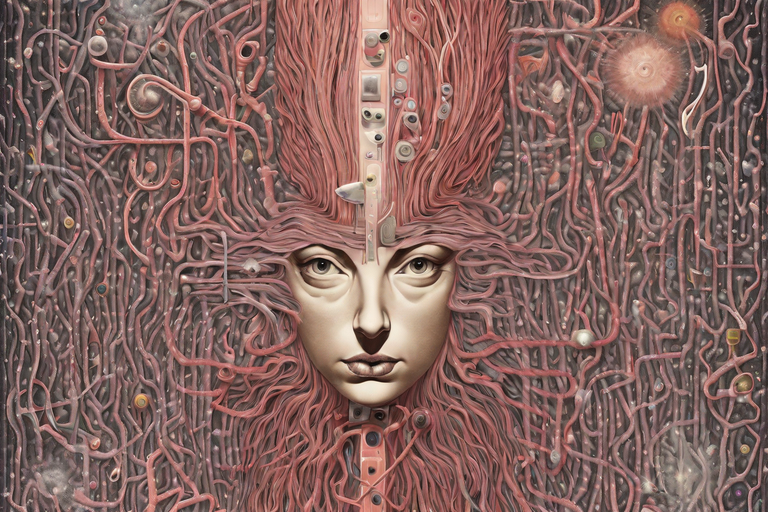Our situation is both a lot simpler and a lot stranger than we generally think it is. Normally, because we tend to think about things a lot the world seems very complicated, full of all sorts of random bits and pieces that need to be considered, that need to be brought into the equation. It is impossible to figure out how it all fits together, no matter how long we spend trying to do so. Really, it’s extremely perplexing – although having said this we always have the option of oversimplifying everything and ignoring all the bits that don’t fit our theory, that don’t fit into our ‘scheme of things’. If we do this then what we of course discover is that everything does fit under the same roof, that everything does dovetail neatly into the one scheme of things. We discover that everything can be accounted for satisfactorily by our theory, which feels great. We get highly excited when this happens – we become positively manic – but the price we pay for this feeling of euphoria is that we make complete fools of ourselves. After all, the only thing we are succeeding at is in deceiving ourselves!
If, on the other hand, we don’t cheat by oversimplifying everything then there are always lots of loose ends and it’s all rather confusing. We’re always trying to marry up elements that don’t fit together, always trying to get aspects of the world to agree that don’t agree. But this confusion and general contradictoriness is only because we are thinking about things, because we are trying to understand our situation via the rational mind, which by its very nature always has to compartmentalize everything.
If we just observe the world, without thinking about what we are observing (if we just allow ourselves to rest in the non-conceptual awareness of what it feel like to be here in the world and observing the world) then of course everything fits together – it’s all just the one! It’s all just ‘what I’m aware of’. Awareness does not draw lines in the sand, it does not try to divide up the territory into parcels, into lots. It isn’t a real estate agent. Or a politician. The world according to the rational mind is made up of lots of different countries – the same world when seen with the unprejudiced eye is simply one world.
So now (with the thinking mind left out of the picture for a while) our situation is – in one way – very simple. We’re just here, being aware of whatever it is that we’re being aware of, and that’s all there is to it. No thinking, no analysis is needed. After all, as Alan Watts says, the world doesn’t mean anything any more than a particular piece of music means anything – it just is. Alan Watts also uses the Buddhist term suchness (or tathata) to explain this quintessential ‘meaninglessness’:
And actually, some of these words that the Buddhists use for the basic energy of the world really don’t mean anything at all. The word tathata, which is translated from the Sanskrit as ‘suchness’ or ‘thusness’ or something like that, really means something more like ‘dadada,’ based on the word ‘tat’, which in Sanskrit means ‘that,’ and so in Sanskrit it is said tat lum asi, ‘that thou art,’ or in modern America, ‘you’re it.’
According to Buddhism the essential nature of everything is suchness or tathata – everything ‘is as it is’: the flavour of it is how it tastes, the sound of it is how it sounds, the smell of it is how it smells, and so on. There is no need to reference our perceptions to some external standard, no need to compare our incoming sense-data (the flavour or the sound or the smell) to an abstract mental yardstick – in fact if we do this then we leave the realm of non-conceptual awareness straightaway and end up in the domain of the rational mind, which is entirely constructed by reference to taken-for-granted standards or categories. There is no suchness in the conceptual world because concepts are always related to an external authorizing framework; nothing stands alone – if it isn’t authorized by the framework then it doesn’t get to be there. How could suchness exist in a scheme like this?
We could therefore – on the basis of this discussion – say that our situation (as long as we don’t think about it) is really remarkably simple: we’re just here and that’s all there is to it! But it turns out that this isn’t true either because even this is a conceptualization, even this is an arbitrary ‘mental fabrication’. If we were to pay attention carefully enough to the experience of ‘just being here’, to the suchness of the moment, then we would see that we seem to be here, but actually we’re not here at all! The sense of ‘being here’ is a conditioned illusion. In a manner of speaking it could be said that we’re ‘bilocating from somewhere else’, only we need to add the proviso – strange as it may sound – that where we’re bilocating from isn’t actually ANYWHERE! Its a place that isn’t a place. As Hafiz says,
Listen: this world is the lunatic’s sphere,
Don’t always agree it’s real,
Even with my feet upon it
And the postman knowing my door
My address is somewhere else.
What we discover when we rest in non-conceptual awareness is that location itself is an arbitrary construct. It’s a notion that slips away from us – like all notions! There is no ‘here’ – ‘here’ could be anywhere and a ‘here’ that could be ‘anywhere’ isn’t actually ‘here’ at all! ‘Here’ is a very arbitrary thing…
‘Here’ means ‘here-but-not-there’ – it doesn’t mean ‘here-but-also-anywhere-else’. It doesn’t reach that far, it doesn’t allow so much. Far from being all-reaching, all-allowing, all-inclusive, ‘here’ is exclusive – it separates the possibilites. It draws lines. This is another way of saying that ‘here’ is a category and, as we have said, in the undivided world there are no categories. So we’re not here, and we’re not anywhere else either (because a ‘there’ turns into a ‘here’ just as soon as you reach it); this however doesn’t mean that we’re just ‘figments of our imagination’ or that we don’t exist, it just means that our true nature – which is awareness – is not pinned down in space and time, is not somehow imprisoned in some sealed compartment somewhere. It means that our true nature is not defined in relation to some external framework of reference. Or we could say that it means our true nature is suchness.
For us – because we habitually operate out of the rational mind – stuff is only real when it is pinned down, when it is securely and exclusively captured in some mental compartment (or category), when it is defined, when it has been properly referenced and catalogued. Otherwise it doesn’t come into the equation. It doesn’t figure. Because of this dependence on ‘the system of reference’ to tell us what’s real and what isn’t we are constitutionally blind to Reality and thus have no choice but to obediently live out our lives within the strict (if pointless) confines of the categorical mind!
What all of this means is that there’s a lot more to us than we let on to ourselves. To say that ‘there’s a lot more to us than we let on to ourselves’ is vastly understating the matter. We have unwittingly imprisoned ourselves in a Finite World (or in a Finite Game, as James Carse says) that isn’t actually real at all. It’s real enough on its own terms, admittedly, but the truth of the matter is that its own terms aren’t to be trusted! The Finite World is a ‘convenient fiction’ – ‘convenient’, we may add, only for itself, only for the purposes of the narrow little game that we are playing. What we see as real isn’t real, and what we implicitly (by virtue of the fact that we are excluding all awareness of it) claim to be unreal is as real as real can be!
In our little world the truth is an unwelcome visitor. The awareness that we don’t actually belong ‘here’ in this over-regulated, cut-and-dried little illusion-realm, that this isn’t our right address at all, is a prohibited awareness. It is prohibited within the terms of the game. We’re required to proclaim our allegiance to this unreal Finite World at every turn; it is after all the height of bad form – and unpatriotic into the bargain – to act as if this finite world were not the alpha and the omega, the beginning and the end of all things.
The eternal is expected to pledge its allegiance to the temporal. The Infinite is required to keep on saying how great the finite is! To put a slightly different slant on this – we could say that the caterpillar is required to swear allegiance (every single day of its life) to being a caterpillar! Or as the rebel economist E.F. Schumacher puts it, we’re all expected to stay as ‘fat, shiny acorns’:
Our ordinary mind always tries to persuade us that we are nothing but acorns and that our greatest happiness will be to become bigger, fatter, shinier acorns; but that is of interest only to pigs. Our faith gives us knowledge of something better: that we can become oak trees.
For the ordinary mind the suggestion that we might be something more than acorns, at least potentially, is frankly incomprehensible – sounds like the ravings of a lunatic. It doesn’t just sound strange – it sounds laughable. It sounds reprehensibly foolish, or ‘dippy’, or ‘escapist’. It is (or so we understand) our solemn duty to go around saying how great it is to be an acorn, how splendid, how responsible, and so on. We should be getting on with our lives as acorns. Doing great acorn things. Acorns are where it’s at!
But we aren’t just exclusively ‘here’ in the way that we think we are, in the narrow, regimented or compartmentalized way that we’re led to believe we are. The truth is far stranger than this – and in a way, more straightforward. There’s nothing ‘complicated’ about it: each one of us is ‘everything that there is’, and we’re not from this Finite World at all! According to Wei Wu Wei, our problem is ‘mistaken identity’. According to Hafiz, it is not just our identity which is mistaken, so too is our address.





